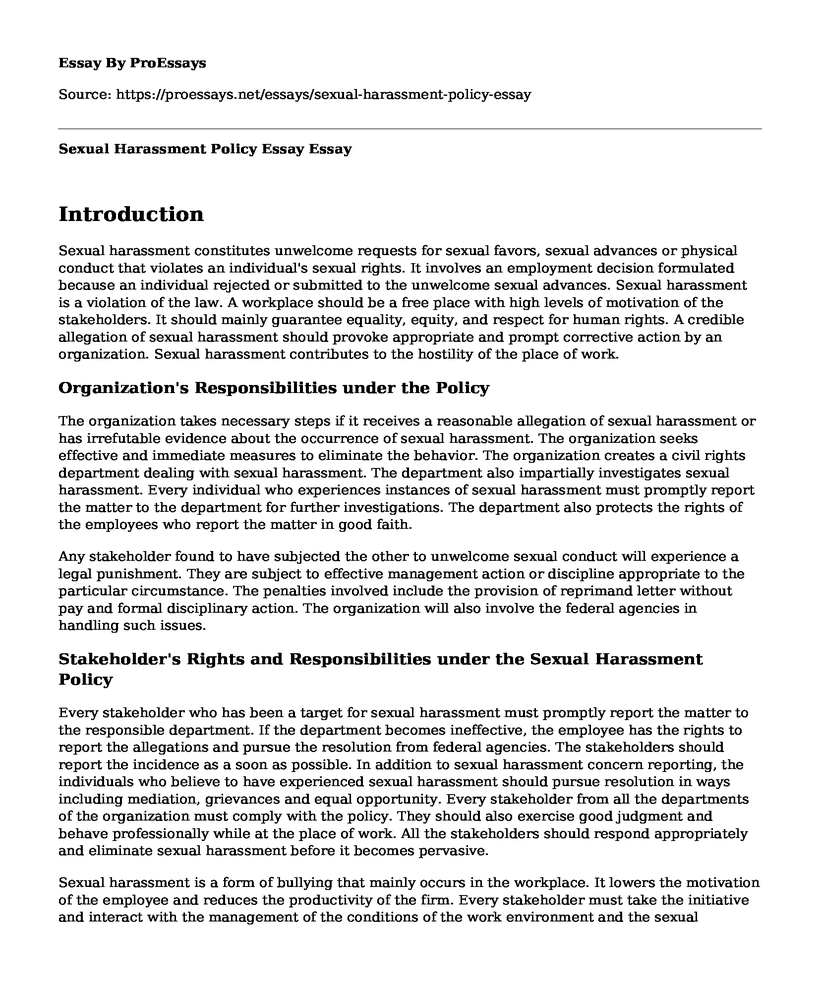Introduction
Sexual harassment constitutes unwelcome requests for sexual favors, sexual advances or physical conduct that violates an individual's sexual rights. It involves an employment decision formulated because an individual rejected or submitted to the unwelcome sexual advances. Sexual harassment is a violation of the law. A workplace should be a free place with high levels of motivation of the stakeholders. It should mainly guarantee equality, equity, and respect for human rights. A credible allegation of sexual harassment should provoke appropriate and prompt corrective action by an organization. Sexual harassment contributes to the hostility of the place of work.
Organization's Responsibilities under the Policy
The organization takes necessary steps if it receives a reasonable allegation of sexual harassment or has irrefutable evidence about the occurrence of sexual harassment. The organization seeks effective and immediate measures to eliminate the behavior. The organization creates a civil rights department dealing with sexual harassment. The department also impartially investigates sexual harassment. Every individual who experiences instances of sexual harassment must promptly report the matter to the department for further investigations. The department also protects the rights of the employees who report the matter in good faith.
Any stakeholder found to have subjected the other to unwelcome sexual conduct will experience a legal punishment. They are subject to effective management action or discipline appropriate to the particular circumstance. The penalties involved include the provision of reprimand letter without pay and formal disciplinary action. The organization will also involve the federal agencies in handling such issues.
Stakeholder's Rights and Responsibilities under the Sexual Harassment Policy
Every stakeholder who has been a target for sexual harassment must promptly report the matter to the responsible department. If the department becomes ineffective, the employee has the rights to report the allegations and pursue the resolution from federal agencies. The stakeholders should report the incidence as a soon as possible. In addition to sexual harassment concern reporting, the individuals who believe to have experienced sexual harassment should pursue resolution in ways including mediation, grievances and equal opportunity. Every stakeholder from all the departments of the organization must comply with the policy. They should also exercise good judgment and behave professionally while at the place of work. All the stakeholders should respond appropriately and eliminate sexual harassment before it becomes pervasive.
Sexual harassment is a form of bullying that mainly occurs in the workplace. It lowers the motivation of the employee and reduces the productivity of the firm. Every stakeholder must take the initiative and interact with the management of the conditions of the work environment and the sexual harassment policy. It assists under the policy efficiently and prevents the act. It also helps employees understand the causes of sexual harassments and how to solve it in the place of work.
Cite this page
Sexual Harassment Policy Essay. (2022, May 09). Retrieved from https://proessays.net/essays/sexual-harassment-policy-essay
If you are the original author of this essay and no longer wish to have it published on the ProEssays website, please click below to request its removal:
- Removal of Indian Names and Mascots in Sports Teams
- Domestic Violence: Annotated Bibliography
- Examining Community Perceptions of the Relationships Between Cyber Bullying and Youth Suicide
- Paper Example on Advancing Equality: 1950s-1960s, Women, Elderly, and Social Security
- Agonist, Partial Agonist, and Antagonist Drugs: Determining Efficacy - Essay Sample
- Paper Example on Women in Olympics: From 2.2% to a Growing Presence
- Workplace Discrimination - Free Report Sample







